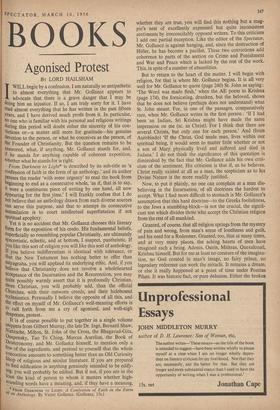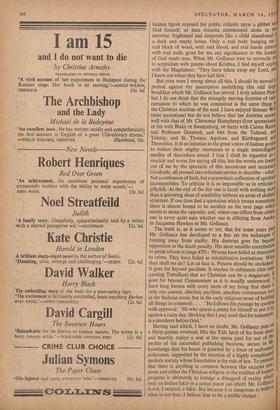BOOKS
Agonised Protest
BY LORD HAILSHAM IWILL begin by a confession. I am naturally so antipathetic to almost everything that Mr. Gollancz appears to advocate that there is a grave danger that I may be doing him an injustice. If so, I am truly sorry for it. I have read almost everything that he has written in the past fifteen Years, and I have derived much profit from it. In particular, no one who is familiar with his personal and religious writings during this period will doubt either the sincerity of his con- victions or—a matter still more for gratitude—his genuine devotion to the person, or what he conceives as the person, of the Founder of Christianity. But the question remains to be answered, what, if anything. Mr. Gollancz stands for, and, if he stands for anything capable of coherent exposition, Whether what he stands for is right.
From Darkness to Light* is described by its sub-title as 'a Confession of faith in the form of an anthology,' and its author Presses the reader 'with some urgency' to read the book from beginning to end as a consecutive whole, 'as if, that is to say, it were a continuous piece of writing by one hand, all now appearing for the first time.' I will frankly confess that I do not believe that an anthology drawn from such diverse sources Can serve this purpose, and that to attempt its consecutive assimilation is to court intellectual superfcetation if not spiritual apoplexy. . Yet it is no accident that Mr. Gollancz chooses this literary Lorin for the exposition of his credo. His fundamental beliefs, superficially so resembling popular Christianity, are ultimately sYncretistic, eclectic, and at bottom, I suspect, pantheistic. If You like this sort of religion you will like this sort of anthology. if you believe indifferentism is identical with tolerance, or that the New Testament has nothing better to offer than satyagraha, you will applaud its underlying ethic. And, if you believe that Christianity does not involve a wholehearted acceptance of the Incarnation and the Resurrection, you may quite possibly warmly assert that it is profoundly Christian, more Christian, you will probably add, than the official Churches, with their outworn creeds, and their hidebound ecclesiastics. Personally I believe the opposite of all this, and the effect on myself of Mr. Gollancz's well-meaning efforts is to call forth from me a cry of agonised, and well-nigh desperate, protest.. It is of course possible to put together in a single volume Nietzsche, from Gilbert Murray, the late Dr. Inge, Bernard Shaw, Nietzsche, Milton, St. John of the Cross, the Bhagavad-Gita, 9uspensky, Tao Te Ching, Marcus Aurelius, the Book of Deuteronomy, and Mr. Gollan'cz himself, to mention only a few of the ingredients, and pretend to yourself that the whole concoction amounts to something better than an Old Curiosity ,op of religious and secular literature. if you are prepared 10 find edification in anything genuinely intended to be edify- I,ng, you will probably be edified. But if not, if you are in the feast the kind of person to whom it matters whether high- sounding words have a meaning, and, if they have a meaning, 1 FROM DARKNESS10 LIGHT. A Confession of Faith in the Form f On Anthology. By Victor Gollancz. (Gollancz, 15s.) whether they are true, you will find this nothing but a mag- pie's nest of excellently expressed but quite inconsistent sentiments by irreconcilably opposed writers. To this criticism I add one partial exception. Like the editor of the Spectator, Mr. Gollancz is against hanging, and, since the destruction of Hitler, he has become a pacifist. These two convictions add coherence to parts of the section on Crime and Punishment and War and Peace which is lacked by the rest of the work. This, in spite of a number of absurdities.
But to return to the heart of the matter. I will begin with religion, for that is where Mr. Gollancz begins. It is all very well for Mr. Gollancz to quote (page 240) St. John as saying : `The Word was made flesh,' when the AE poem to Krishna (page 174), the fornicating, drunken, but the beloved, shows that he does not believe (perhaps does not understand) what St.' John meant. For, in one of the passages, comparatively rare, when Mr. Gollancz writes in the first person : 'If I had been an Indian, Sri Krishna might have made the same impression on me (sc. as Christ). For I think that there are several Christs, but only one for each person.' And (from Aurobindo) 'If the Christ, God made man, lives within our spiritual being, it would seem to matter little whether or not a son of Mary physically lived and suffered and died in Judaea.' I do not think the significance of this quotation is diminished by the fact that Mr. Gollancz adds his own criti- cism of the sentiment. His criticism is that if, as he believes, Christ really existed at all as a man, the scepticism as to his Divine Nature is the more readily justified.
Now, to put it plainly, no one can complain at a man dis- believing in the Incarnation, of all doctrines the hardest to accept. What I find more difficult to stomach is Mr. Gollancz's assumption that this hard doctrine—to the Greeks foolishness, to the Jews a stumbling-block—is not the crucial, the signifi- cant test which divides those who accept the Christian religion from the rest of all mankind.
Granted, of course, that all religion springs from the mystery of pain and wrong, from man's sense of loneliness and guilt, and his need for a Redeemer. Granted, too, that at many times, and at very many places, the aching hearts of men have imagined such a being, Adonis, Osiris, Mithras, Quexalcoatl, Krishna himself. But for me at least no creature of the imagina- tion, no God created in man's image, no fairy prince, no legendary redeemer can work the miracle. It remains a dream, or else it really happened at a point of time under Pontius Pilate. It was historic fact, or pure delusion. Either the broken human figure exposed for public ridicule upon a gibbet War God himself, or man remains unredeemed alone in tills universe, frightened and desperate like a child abandoned is a dark and empty house. Only a real body hanging on real block of wood, with real blood, and real hands pierced with real nails. gives for me any significance to the fantas1 of God made man. When Mr. Gollancz tries to reconcile Inc to scepticism with poems about Krishna. I find myself saying, with the Magdalene: 'They have taken away my Lord, and I know not where they have laid him.' But even were I wrong about all this, I should be moved r° protest against the assumption underlying this odd dogs breakfast which Mr. Gollancz has served. I truly admire Plate, but I do not think that the strangely moving doctrine of rein' carnation to which he was committed is the same thing as, the Christian doctrine of the soul. I have enjoyed Simone Well (nine quotations) but do not believe that her doctrine assorts well with that of Mr. Christmas Humphreys (four quotations), or his with Blake or Swedenborg, or theirs with Canon Raven and Professor Grensted, and bits from the Talmud, and Tolstoy, and St. Thomas Aquinas, and Kierkegaard and Theocritus. It is an injustice to the great voices of human genius to reduce their mighty utterances to a single unintelligible medley of discordant sound. I fear I shall be regarded as a, mocker and worse for saying all this, but the words are forcer' out of me by the spectacle of this monstrous and unnatura,! 'cavalcade, all pressed into reluctant service to describe—what., Not a confession of faith, but a syncretistic collection of spiritual incompatibles. To criticise it is as impossible as to criticise 3 jellyfish. At the end of the day one is faced with nothing men; than a quivering mass of sensibility without an atom of skeletal structure. If one does find a quotation which means something,' there is almost bound to be another on the next page which seems to mean the opposite, and, where one differs from either, one is never quite sure whether one is differing from Asoka' or Jacquetta Hawkes or Mr. Gollancz. The truth is, as it seems to me, that for some years Past Mr. Gollancz has developed to a fine art the technique °s ,1 running away from reality. His doctrine goes far beyond opposition to the death penalty. His most sensible contribution to penal reform is (page 470): 'Prisons have failed as deterrents to crime. They have failed as rehabilitative institutions. WO 12s. 6d. then shall we do? Let us face it. Prisons should be abolished'. It goes far beyond pacifism. It teaches in substance (this tiff quoting Tertullian) that no Christian can be a magistrate. 11 goes far beyond Communism as it is usually understood. have long known with every atom of my being that there is only one answer, absolute pacifism, absolute communism (n°1 in the Stalinist sense, but in the early religious sense of holding all things in common). . . .' He follows this passage by quoting with approval : 'He who spares a penny for himself to put it by against a rainy day, thinking that I may need that for tomorrogi, is a murderer before God.'
Having said which, I have no doubt, Mr. Gollancz puts 011 a thirty-guinea overcoat, lifts the Yale latch of his front door, and heartily enjoys a seat at the opera paid for out of the profits of his successful publishing business, secure in tr'; knowledge that his house is guarded by a force of uniforfnc‘i policemen, supported by the taxation of a highly complicatec, modern society whose foundation is the rule of law. To preteno that there is anything in common between this escapist Doll; sense and either the Christian religion or the realities of ht101,1ilb progress is ultimately to indulge a disregard of reality vvb)c,i only an Indian fakir or a surtax payer can afford. Mr. Gollance is not, I suspect, a fakir. But because it is dangerous to belies/ what is not true, 1 believe him to be a public danger.



































 Previous page
Previous page